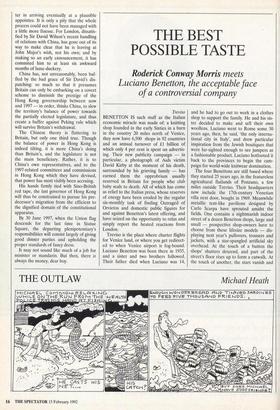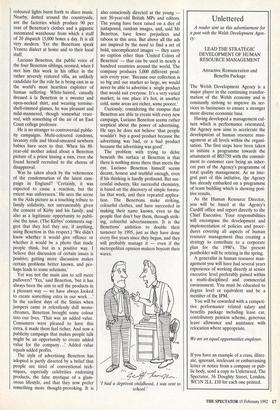THE BEST POSSIBLE TASTE
Roderick Conway Morris meets
Luciano Benetton, the acceptable face of a controversial company
Treviso BENETTON IS such stuff as the Italian economic miracle was made of: a knitting shop founded in the early Sixties in a barn in the country 20 miles north of Venice, they now have 6,500 shops in 92 countries and an annual turnover of £1 billion of which only 4 per cent is spent on advertis- ing. Their new publicity campaign — in particular, a photograph of Aids victim David Kirby at the moment of his death, surrounded by his grieving family — has earned them the opprobrium usually reserved in Britain for people who club baby seals to death. All of which has come as relief to the Italian press, whose reserves of energy have been eroded by the regular six-monthly task of finding Outraged of Orvietos and domestic public figures for and against Benetton's latest offering, and have seized on the opportunity to relax and simply report the heated reactions from London.
Treviso is the place where charter flights for Venice land, or where you get redirect- ed to when Venice airport is fog-bound. Luciano Benetton was born there in 1935, and a sister and two brothers followed. Their father died when Luciano was 14, and he had to go out to work in a clothes shop to support the family. He and his sis- ter decided to make and sell their own woollens. Luciano went to Rome some 30 years ago, then, he said, 'the only interna- tional city in Italy', and drew particular inspiration from the Jewish boutiques that were far-sighted enough to see jumpers as a fashionable product. Luciano hotfooted it back to the provinces to begin the cam- paign for world-wide knitwear domination.
The four Benettons are still based where they started 25 years ago, in the featureless agricultural flatlands of Ponzano, a few miles outside Treviso. Their headquarters now include the 17th-century Venetian villa next door, bought in 1969. Meanwhile metallic tent-like pavilions designed by Carlo Scarpa have sprouted amidst the fields. One contains a nightmarish indoor street of a dozen Benetton shops, large and small — prospective shop-owners have to choose from these lifesize models — dis- playing next year's pullovers, trousers and jackets, with a star-spangled artificial sky overhead. At the touch of a button the shops' shutters descend, and part of the street's floor rises up to form a catwalk. At the touch of another, the stars vanish and coloured lights burst forth to disco music. Nearby, dotted around the countryside, are the factories which produce 90 per cent of Benetton's clothes and a gigantic automated warehouse from which a staff of 20 dispatch 15,000 boxes a day. It is all very modern. Yet the Benettons speak Veneto dialect at home and to their local staff.
Luciano Benetton, the public voice of the four Benetton siblings, seemed, when I met him this week in his office in the rather severely restored villa, an unlikely candidate for the role he is being cast in as the world's most heartless exploiter of human suffering. White-haired, casually dressed a la Benetton in a sweater and open-necked shirt, and wearing tortoise- shell-rimmed glasses, he was pleasant and mild-mannered, though somewhat reser- ved, with something of the air of an East Coast college professor.
He is no stranger to controversial public- ity campaigns. Multi-coloured condoms, lavatory rolls and blood-smeared newborn babies have seen to that. When his 80- year-old mother asked about a Benetton picture of a priest kissing a nun, even she found herself recruited to the chorus of disapproval.
Was he taken aback by the vehemence of the condemnation of the latest cam- paign in England? 'Certainly, it was expected to cause a reaction, but the extent was unforeseen.' He sees the scene in the Aids picture as a touching tribute to family solidarity, not unreasonably given the consent of Kirby and his family, and also as a legitimate opportunity to publi- cise the issue. (The Kirbys' comments sug- gest that they feel they are, if anything, using Benetton in this respect.) 'We didn't know whether it would give offence or whether it would be a photo that made people think, but in a positive way. I believe that discussion of certain issues is positive; getting more discussion makes certain problems better known, and per- haps leads to some solutions.'
Yet was not the main aim to sell more pullovers? 'Yes,' said Benetton, 'but it has always been the aim to sell the products in a pleasant way — we have always looked to create something extra in our work ...'
In the earliest days of the Sixties when jumpers came in relentlessly dull mono- chromes, Benetton brought some colour into our lives. 'That was an added value. Consumers were pleased to have this extra, it made them feel richer. And now a publicity campaign that makes people talk might be an opportunity to create added value for the company ...' Added value equals added profits.
The style of advertising Benetton has adopted is partly directed by a belief that people are tired of conventional tech- niques, especially celebrities endorsing products, the false mystique of a glam- orous lifestyle, and that they now prefer something more thought-provoking. It is
also consciously directed at the young not 50-year-old British MPs and editors. The young have been raised on a diet of juxtaposed, random images, and, said Mr Benetton, have fewer prejudices and taboos in this area. But above all the ads are inspired by the need to find a set of bold, uncomplicated images — they carry no caption other than 'United Colors of Benetton' — that can be used in nearly a hundred countries around the world. The company produces 5,000 different prod- ucts every year. 'Because our collection is so big and our market so large, we would never be able to advertise a single product that would suit everyone. It's a very varied market; in one place it's hot, in another cold, some areas are richer, some poorer.'
Curiously, considering the rumpus that Benetton are able to create with every new campaign, Luciano Benetton seems rather sceptical about the power of advertising. He says he does not believe 'that people wouldn't buy a good product because the advertising was bad, or a bad product because the advertising was good'.
The problem with trying to delve beneath the surface at Benetton is that there is nothing more there than meets the eye. Luciano Benetton himself seems decent, honest and truthful enough, even if his thinking is hardly profound. But suc- cessful industry, like successful chemistry, is based on the discovery of simple formu- las that work, and their repeated applica- tion. The Benettons make striking, colourful clothes, and have succeeded in making their name known, even to the people that don't buy them, through strik- ing, colourful advertisements. It is the Benettons' ambition to double their turnover by 1995, just as they have done every five years since they began, and they will probably manage it — even if the metropolitan opinion-makers boycott their wares.
'I had a deprived childhood, I was sent to school.'



























































 Previous page
Previous page